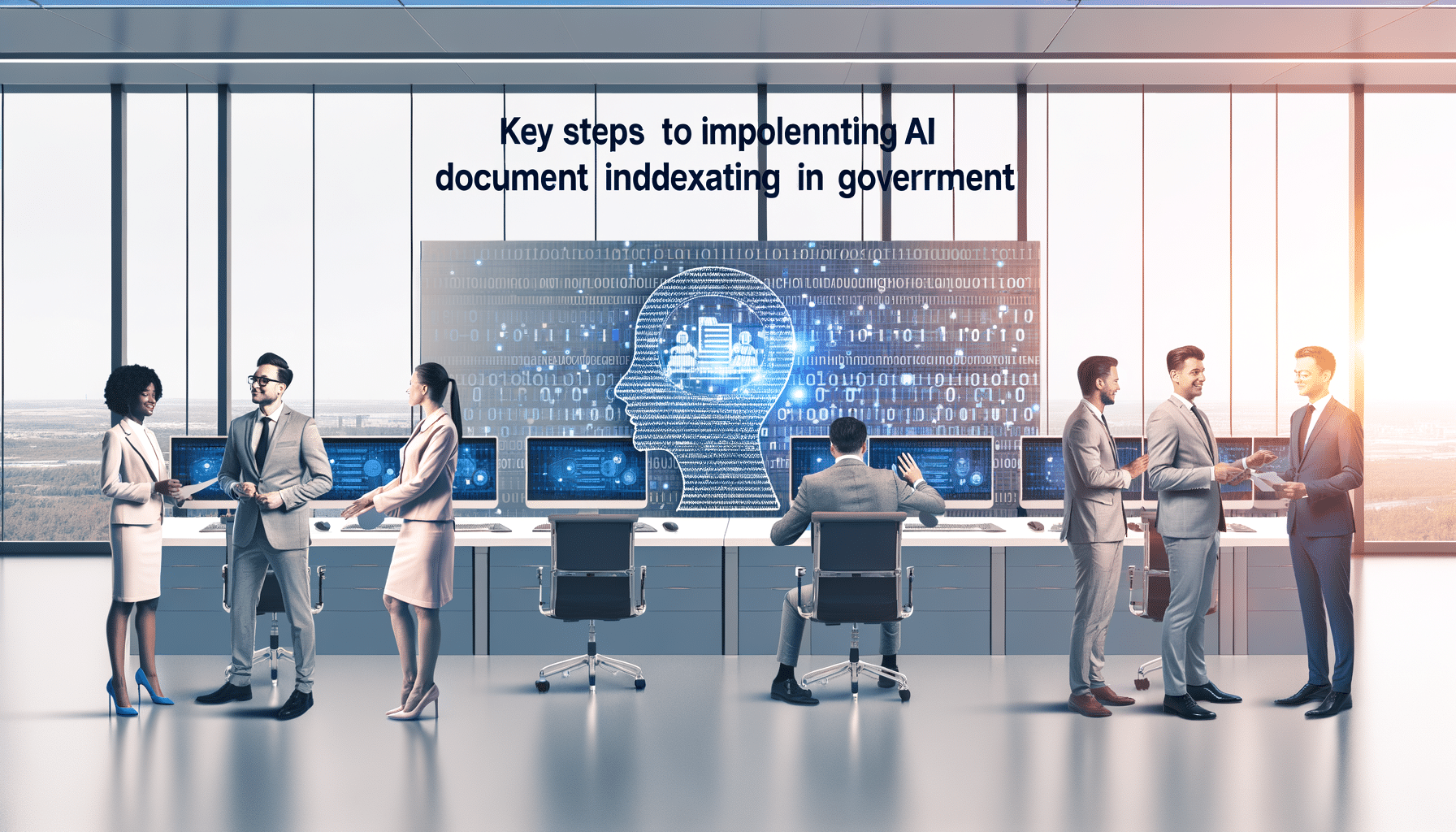- AI Implementations
- June 8, 2024
Key Steps to Implementing AI-Based Document Indexing in Government

Introduction
The rise of AI-based document indexing is reshaping how government agencies manage vast amounts of records and data. It addresses key challenges such as inefficiency, security, and compliance issues that traditional record management systems fail to solve. In my journey of creating RecordsKeeper.AI, I’ve seen firsthand how transformative the impact of AI can be in document management. Allow me to guide you through the key steps to implement AI-based document indexing to enhance efficiency and efficacy in government settings.
Understanding AI-Based Document Indexing
AI-based document indexing involves utilizing artificial intelligence to automate the categorization and retrieval of documents. Unlike manual processes that are prone to human error and inefficiency, AI accelerates the indexation task, allowing for the seamless search and retrieval of records based on natural language queries. This tech innovation does not just streamline operations—it revolutionizes them.
The Role of AI in Document Management
AI leverages machine learning algorithms to “learn” how to classify documents based on their content and context. This not only improves accuracy but also saves time, reduces costs, and minimizes the risk of data mishandling. At RecordsKeeper.AI, I harnessed AI’s potential to foresee a future where document management becomes a strategic asset rather than a daunting task.
Key Steps for Implementation
1. Assessing the Current System
Before diving headfirst into implementing AI, it is critical to assess the existing document management system. Identify inefficiencies, bottlenecks, and compliance gaps. Understanding these areas helps tailor the AI solution to effectively address specific needs, ensuring a smoother integration process.
2. Selecting the Right AI Platform
Choosing the AI platform that best aligns with government requirements is a crucial step. Look for solutions that offer automated categorization, secure data handling, compliance management, and robust backup capabilities. The right platform should combine efficiency with security. RecordsKeeper.AI, with its AI-powered categorization and blockchain integration, can be a valuable contender.
3. Data Preparation and Cleaning
For AI to function optimally, data integrity is paramount. This involves cleaning and organizing existing records to ensure accuracy. By removing duplicates and outdated entries, the government can feed quality data into the AI system, resulting in more precise document indexing.
4. Training AI Algorithms
Training AI models involves feeding them with vast amounts of historical and operational data to “learn” categorization patterns. It can require supervised training where human intervention corrects AI’s mistakes or a combination of supervised and unsupervised learning models—a method I find highly effective in enhancing AI’s accuracy over time.
5. Implementing and Testing the System
Direct implementation without comprehensive testing can lead to catastrophic failures. It is imperative to conduct thorough testing to identify potential glitches or inefficiencies. This phase ensures the AI system functions as expected and is adept at handling government-level document complexities.
6. Upskilling the Workforce
AI implementation can create apprehension among government staff due to its transformative nature. Training and upskilling employees to work alongside AI systems ensures smooth transitions and boosts adoption. By understanding AI’s capabilities, government staff can leverage it to their advantage, thus integrating it more effectively into daily operations.
Benefits of AI-Based Document Indexing in Government
Enhanced Operational Efficiency
By automating time-consuming tasks, AI liberates the workforce to focus on more crucial responsibilities, drastically improving productivity. The streamlined process of document retrieval through AI reduces operational latency, which is crucial for government productivity.
Improved Security and Compliance
AI platforms equipped with blockchain technology can ensure tamper-proof record management, thereby enhancing data security. Automated compliance checks, like those offered by RecordsKeeper.AI, guarantee adherence to regulations such as GDPR and HIPAA, eliminating potential legal pitfalls.
Cost Reduction
The reduction in manual labor and paper-based processes significantly lowers operational costs. AI systems, once properly integrated, offer long-term savings while delivering unparalleled efficiencies.
Conclusion
AI-based document indexing is the cornerstone of modernizing government record management systems. With a thoughtful implementation strategy, governments can leverage AI to create more efficient, secure, and compliant document management workflows. I encourage you to explore AI solutions like RecordsKeeper.AI, where technology meets innovation to transform how we manage records. Embrace this technology, and pave the way to a more efficient future.
Toshendra Sharma is the visionary founder and CEO of RecordsKeeper.AI, spearheading the fusion of AI and blockchain to redefine enterprise record management. With a groundbreaking approach to solving complex business challenges, Toshendra combines deep expertise in blockchain and artificial intelligence with an acute understanding of enterprise compliance and security needs.
Archives
- January 2025
- December 2024
- November 2024
- October 2024
- September 2024
- August 2024
- July 2024
- June 2024
- May 2024
- April 2024
- March 2024
- February 2024
- January 2024
- December 2023
- November 2023
- October 2023
- September 2023
- August 2023
- July 2023
- June 2023
- May 2023
- April 2023
- March 2023
- February 2023
- January 2023
- December 2022
- November 2022
- October 2022
- September 2022
Want to get more content like this?
Signup to directly get this type of content to your inbox!!
Latest Post
Document Control for Equipment Maintenance
- January 20, 2025
Managing Records for Multiple Clients
- January 19, 2025
Handling Conference Documentation
- January 18, 2025
Setting Up Department Record Reviews
- January 17, 2025





